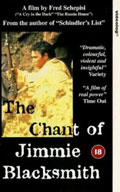
Directed by
Fred Schepisi
120 minutes
Rated M
Reviewed by
Bernard Hemingway


The Chant Of Jimmie Blacksmith
Set in turn-of-the-century Northern NSW, The Chant Of Jimmie Blacksmith is a powerful condemnation of the colonizing White Establishment’s treatment of Aboriginals and, indeed, in general, of racial prejudice and the injustice that it breeds..
Using much the same creative team as he had for his previous and debut feature film, The Devil’s Playground (1976), including Ian Baker (photography), Bruce Smeaton (music), Brian Kavanagh (editor) and the director once again adapting a Thomas Keneally novel, the result is a significant step forward from his first film, delivering, despite being slightly overlong, the emotional impact that the earlier film lacked.
Based on historical fact, the film tells the story of Jimmie Blacksmith (Tommy Lewis, an untrained actor who has since had a reasonable screen career), a half-caste Aboriginal, adrift between two worlds, to neither of which he belongs. Brought up by a Methodist missionary (Jack Thomson), once he gains his manhood he finds that he is rejected by white society. To make matters worse, he has a white wife (Angela Punch McGregor). Chronically ill-treated by the white settlers, Jimmie finally cracks and the ensuing bloodbath turns him and his full-blooded half-brother, Mort (Freddy Reynolds), into hunted men. Other cast members included Ruth Cracknell, Bryan Brown and up-and-comer John Jarratt, with Keneally having a cameo as a camp cook.
Whilst Schepisi demonstrated his commitment to challenging subject matter with The Devil’s Playground here he definitively confirms it, eschewing the more winsomely nostalgic crinoline and parasol style characteristic of Australian film of the time for something which presents instead a damning portrayal of the ignorance and brutality of Australia's early white settlers. Perhaps this is why, despite being a superbly-made film (at $1.2m the most expensive Australian film made up to that time), and receiving positive reviews it failed commercially. It was, however, invited into competition for the Palme D’Or at Cannes and recognised overseas for its superior quality.
The Chant Of Jimmie Blacksmith was not only one of the outstanding films of the period but remains one of our finest film achievements full stop. It also launched Schepisi’s international career, the director not making another film on Australian soil until Evil Angels in 1988.
Want something different?





